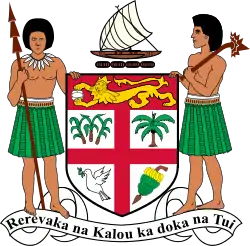March 1977 Fijian general election
General elections were held in Fiji between 19 March and 2 April 1977.[1] As a result of a split in the ethnic Fijian vote, the ruling Alliance Party of Prime Minister Kamisese Mara suffered a narrow defeat. Although the Alliance Party received the most votes, it won only 24 seats, two fewer than the Indo-Fijian-dominated National Federation Party (NFP). One seat was won by the Fijian Nationalist Party, with the remaining seat going to an independent candidate, Osea Gavidi.
 |
|---|
| This article is part of a series on the politics and government of Fiji |
Although the NFP emerged as the largest party, Governor-General George Cakobau asked Mara to form a new government, claiming that he had the support of the majority of the House. The new government remained in office until early elections in September the same year.
Results
Around 25% of the Fijian vote went to the new Fijian Nationalist Party of Sakeasi Butadroka,[2] an extremist organisation that ran on a "Fiji for the Fijians" platform and advocated the repatriation of Indo-Fijians to India.
Three ministers – Peniame Naqasima, Josua Toganivalu and Sakiasi Waqanivavalagi – lost their seats.[3]
| Party | Votes | % | Seats | +/– |
|---|---|---|---|---|
| Alliance Party | 338,523 | 46.0 | 24 | –9 |
| National Federation Party | 332,764 | 45.2 | 26 | +7 |
| Fijian Nationalist Party | 39,238 | 5.3 | 1 | New |
| Independents | 25,142 | 3.4 | 1 | +1 |
| Invalid/blank votes | 47,690 | – | – | – |
| Total | 783,357 | 100 | 52 | 0 |
| Total ballots cast | 190,291 | – | – | – |
| Registered voters/turnout | 280,784 | 74.7 | – | – |
| Source: Nohlen et al. | ||||
Aftermath
Following the elections Mara resigned as Prime Minister on 5 April and turned down offers from the NFP to participate in a coalition government.[3] It was expected that the NFP would be unable to form a government without a majority, but independent MP Osea Gavidi announced that he would support the party, giving it a two-seat majority.[3] However, Gavidi changed his mind the following day.[3]
Four days after the election, Sidiq Koya arrived at Government House expecting to be offered the opportunity to form a government. However, he was told by Governor-General Cakobau that he had reappointed Mara.[3] Cakobau then made a statement claiming that Mara had the support of the majority of MPs.[3] Pacific Islands Monthly reported that following an NFP meeting to discuss the allocation of cabinet portfolios (in which Koya only narrowly won a vote to remain leader of the party), opponents of Koya had passed a message to the Governor-General stating that they would not support him as Prime Minister.[3] Supporters of Koya subsequently blamed a faction led by NFP president Irene Jai Narayana for keeping the party out of office.[2]
In June Mara moved a motion of confidence in his government. The NFP proposed an amendment that the Governor-General should ignore any request from Mara to dissolve parliament if the motion was defeated, and instead appoint Koya as Prime Minister. House Leader Jonati Mavoa claimed that the Governor-General had no legal right to ignore such a request. The NFP amendment passed after Butadroka voted in favour. However, Cakobau dissolved parliament at the end of June,[4] with fresh elections later scheduled for September.
References
- Nohlen, D, Grotz, F & Hartmann, C (2001) Elections in Asia: A data handbook, Volume II, p653 ISBN 0-19-924959-8
- Unscrmabling the broken eggs in Fiji's political basket Pacific Islands Monthly, June 1977, p12
- 'Fiji for Fijians' brings these islands to the brink Pacific Islands Monthly, May 1977, pp8–10
- With an election in the offing, Fiji's cliff-hanger continues Pacific Islands Monthly, July 1977, p11